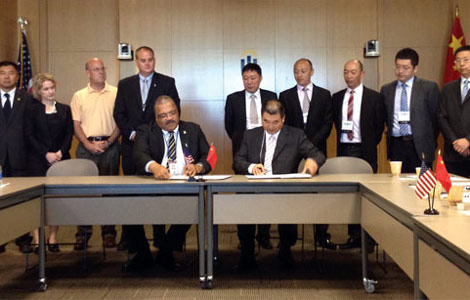IBM will try to curb Beijing's pollution
Updated: 2014-07-08 11:55
By Elizabeth Wu in New York (China Daily USA)
|
||||||||
China's government does it; so does the US Embassy in Beijing. And now International Business Machines Corp. (IBM) will measure Beijing's air pollution - and more.
IBM announced on Monday that it has signed a contract with the Beijing municipal government to determine the type, source and level of emissions to predict air quality in the capital.
China's government agencies and the US Embassy in Beijing already publicly report real-time pollution levels to residents. The government initiates emergency measures when the Particulate Matter (PM 2.5) concentrations rise too high, including regulating factories and limiting the number of cars on the road. IBM said it hopes to design a better tailor-made system.
"By applying supercomputing processing power, scientists from IBM and the Beijing government aim to create visual maps showing the source and dispersion of pollutants across Beijing 72 hours in advance with street-scale resolution. This capability does not exist today," Steve Tomasco, IBM's research director of communications, wrote in an email to China Daily on Monday.
IBM's cognitive computing systems will analyze and learn from streams of real-time data generated by air quality monitoring stations, meteorological satellites and IBM's new-generation optical sensors - all connected by the Internet of things, he wrote.
"IBM believes that through advanced technologies such as cognitive systems, cloud computing and internet of things, China has the opportunity to lead the world in energy and environmental management and create an innovation ecosystem which will further contribute to the country's economic growth," he added.
Armonk, New York-based IBM has 20 years' experience in weather modeling, Jin Dong, an IBM Research director involved in the project, told PC World Magazine on Monday, but he said forecasting air quality will require new computer modeling to take into account all of Beijing's different pollution sources. IBM is also partnering with academics and industry players to pull pollution-related data from local air quality stations and weather satellites, he said.
"You not only have to build a model that can predict. You have to provide a decision system so that people can take proper action," Xiaowei Shen, director of IBM research in China, told the magazine. The system could help suggest preventive measures to keep the city's air quality from approaching hazardous levels because it would know when to take rapid action to adjust production at certain factories, or where to limit car traffic, and alert citizens about developing air quality issues, he said.
"As a leader in climate modeling, cognitive computing and predictive analytics, IBM Research can provide a lot of value to Beijing and other Chinese cities which are facing significant pressure to better monitor, respond to and address air pollution issues," Tao Wang, resident scholar of the energy and climate program at the Carnegie-Tsinghua Center for Global Policy, based in Beijing, told Quartz Internet news site.Wang said science-based decision support systems, combined with sophisticated data analysis is exactly what the Chinese government needs to address the country's energy and environmental issues.
"IBM technologies per se are definitely not the solution to China's emerging problems," Ma Haibing, senior research associate and China program manager at the WorldWatch Institute in Washington, wrote in an email to China Daily on Monday."IBM can only provide the very basic raw computing and modeling power of dealing with environmental challenges."
IBM's work with Beijing on air pollution is part of the company's larger effort, known as "Green Horizon". The company has been designing systems to better manage China's electric grid, using big data analytics and weather modeling to forecast availability of renewable energies like wind and solar power sources, which should limit the amount of that energy being wasted.
The third part of the plan involves a system that IBM is developing to help industrial companies manage energy consumption. The company said in its press release that it is helping Hengqin Island in Guangdong province to cut energy consumption, costs and carbon emissions.
IBM's announcement on Monday came as it seeks to counter declining sales in China, where revenue fell 20 percent last quarter, hurt by decreasing hardware spending, Bloomberg News reported.
China also is reviewing whether domestic banks' reliance on IBM's high-end servers compromises the nation's financial security, Bloomberg News reported on May 27. IBM said in May it wasn't aware of any government policy recommending against use of its servers.
For China Daily
(China Daily USA 07/08/2014 page3)

 Silicon Valley rally calls on Fox News to fire Beckel
Silicon Valley rally calls on Fox News to fire Beckel
 Look who's two, Xiao Liwu!
Look who's two, Xiao Liwu!
 Philadelphia Orchestra meets the press
Philadelphia Orchestra meets the press
 Chinese, US naval hospital ships conduct exchange
Chinese, US naval hospital ships conduct exchange
 High rent pressures NYC Asian eateries
High rent pressures NYC Asian eateries
 Artists advocate for environmental protection
Artists advocate for environmental protection
 Wichita, Kansas to Xi'an, China: Come fly with us
Wichita, Kansas to Xi'an, China: Come fly with us
 Amateur team aims for great heights
Amateur team aims for great heights
Most Viewed
Editor's Picks

|

|

|

|

|

|
Today's Top News
Ex-security chief Zhou Yongkang under probe
Microsoft probed for monopoly
4 charged for murdering student
Prudence urged over solar dispute
Baidu developing 'self-driving' car
US visa delays likely to continue
McDonald's fishing for supplier
OSI group to fund food safety
US Weekly

|

|







